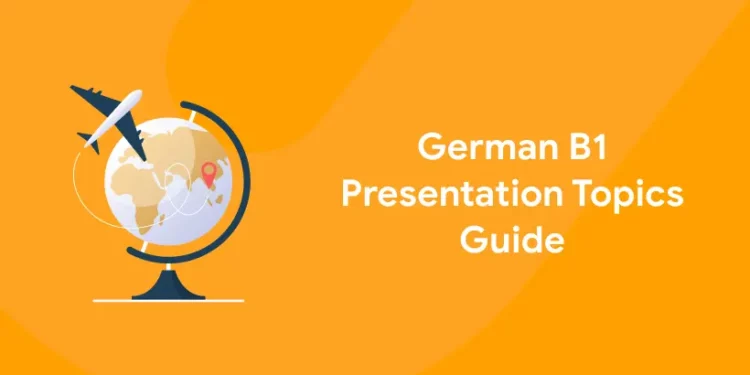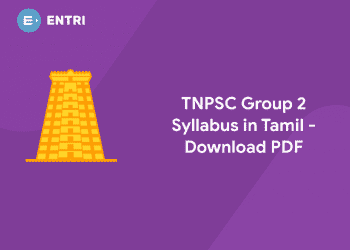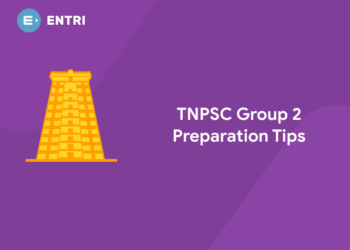Table of Contents
Are you preparing for the German B1 exam? Are you looking for German B1 presentation Topics? Then this is the right place for you. It is quite possible to prepare for the German oral exams B1 TELC, Goethe, ÖSD (AU), or Fide (CH) if you know how. In this article, we will list some of the important German B1 presentation Topics that will help you pass the above-listed German B1 proficiency exams.
Want to prepare some German B1 presentation Topics with the help of a mentor? Join now!
German B1 Presentation Topics: Introduction
Level B1, sometimes called the “intermediate” or “threshold” level, is the third of these six levels. It represents a substantial advancement from the A2 level and the turning point from basic to independent language usage. A B1 user can comprehend the essential ideas of plain standard input on topics they are acquainted with and frequently come across at work, school, play, etc., according to the CEFR.
When travelling in a region where the language is spoken, they are capable of handling the majority of circumstances that may come up. They are capable of producing basic linked writing on subjects that they are familiar with or find interesting. They can also provide brief justifications and explanations for ideas and plans, as well as descriptions of experiences, events, dreams, goals, and ambitions.
There are several ways in which the B1 level differs from both the levels above and below it. For example, a B1 user may link words in an easy way to explain experiences and events, dreams, goals, and objectives, whereas an A2 user can use simple phrases and sentences to describe where they live and the individuals they know. Conversely, a B2 user possesses a level of proficiency that surpasses that of a B1 user, allowing for frequent, stress-free conversation with native speakers due to their increased fluency and spontaneity.
B1 speakers are capable of dealing with the majority of circumstances that may happen when travelling in a language-speaking environment. They may start a discussion on familiar, personal, or ordinary themes (for example, family, interests, job, travel, and current events) without any preparation. They can easily link language to explain experiences and events, dreams, goals, and objectives.
German B1 Sprechen (Speaking Exam)
1: How do you say "Good Morning" in German?
The speaking test (Sprechen) is one of the four modules of the German B1 exam, alongside reading, listening, and writing. It is often considered the most challenging part for learners, but with the right preparation and understanding of its format, you can approach it with confidence. The B1 exam aims to test your ability to use German in everyday life and express yourself fluently on familiar topics.
Duration: About 15 minutes
Structure: Conducted in pairs or small groups
Parts of the B1 Speaking Exam:
-
Part 1 – Planning (ca. 3 minutes, 28 marks)
-
You and your partner will get a situation where you must plan something together—for example, a trip, a party, or a joint activity.
-
You need to exchange ideas, make suggestions, agree or disagree politely, and come to a decision.
-
Example: “Sollten wir am Wochenende ins Kino gehen oder ein Picknick machen?”
-
-
Part 2 – Presentation (ca. 3 minutes, 40 marks)
-
Here you choose one of two given topics and prepare a short presentation.
-
Your presentation should include a clear structure: introduction – main points – conclusion.
-
Example topics: Gesundheit und Sport (health & sports), Social Media, Reisen, Haustiere.
-
-
Part 3 – Interaction (ca. 3–4 minutes, 16 marks)
-
After your partner’s presentation, you are expected to ask them a question.
-
Then you’ll be asked a question by your partner and need to respond.
-
This tests your ability to listen actively, respond naturally, and engage in dialogue.
-
Pronunciation and Fluency (16 marks)
-
You are also graded on clear pronunciation, correct intonation, and natural flow of speech throughout all tasks.
Free German A1 Mock Tests – Powered by AI!
Test your skills on our interactive platform. Get instant feedback from our AI to help you communicate better and track your progress. Start your free German mock test now.
Test Your German A1 for FreeImportance of Presentation Skills at B1 Level
A strong presentation plays an important role in numerous aspects of life, from business and academia to interpersonal relationships. Making an engaging presentation is an important ability that has many applications in the workplace.
First of all, a skillfully designed presentation can enthral and involve those in attendance. Presenters may hold the attention of their audience the whole time they are speaking by employing powerful narrative strategies, visual aids, and a clear structure.
Additionally, a well-crafted presentation accentuates credibility and competence. An audience is positively impacted when a presenter conveys their material with assurance and clarity. This builds confidence in the presenter’s knowledge and improves their reputation.
Furthermore, a persuasive presentation has the power to affect how decisions are made. A strong message has the power to influence good results, whether it is persuading stakeholders to support a project, persuading potential investors to fund a company, or motivating individuals to take action. Understanding the value of presentations requires taking into account both their benefits and limitations.
Moreover, an engaging presentation leaves the audience with an unforgettable experience. A speaker creates a lasting impression on the audience when they apply the Principles of Presentation to deliver their material with zeal and passion. This increases the content’s impact and memorability.
So, we can infer from all these that presentation skills are quite important when it comes to language abilities. Let us look at some German B1 presentation Topics for preparing for the presentation skill test.
Get the best teachers to learn German B1 presentation Topics! Join Entri online German course!
Popular German B1 Presentation Topics in 2026
Some popular German B1 presentation topics in 2026 are listed below.
| No. | Topic in English | Topic in French |
| 1 | Many people eat ready meals | Viele Leute essen Fertigmenüs |
| 2 | Diet or Food | Essen und Trinken |
| 3 | Do vegetarians live healthier? | Leben Vegetarier gesünder? |
| 4 | Can you really find love on Dating Websites? | Kann man auf Dating-Websites wirklich Liebe finden? |
| 5 | Should both women and men take care of household duties? | Sollten sich sowohl Frauen als auch Männer um den Haushalt kümmern? |
| 6 | Assisting people in your free time | Leuten in der Freizeit helfen |
| 7 | Still living with parents at 25 | Mit 25 noch bei den Eltern leben |
| 8 | It is easy to live in a foreign country | Ist es einfach in einem fremden Land zu leben. |
| 9 | Go to the cinema or watch TV | ins Kino gehen oder Fernsehen |
| 10 | Is internet good or bad for us? | Ist internet gut oder schlecht für uns? |
| 11 | Everything in one place: Shopping centres | alles an einem Platz: Einkaufszentren |
| 12 | Should grandparents babysit? | Sollten Großeltern Babysitten? |
| 13 | Should children make decisions by themselves? | Sollten Kinder alleine Entscheiden? |
| 14 | What are your thoughts on extreme sports? | Was denken Sie über Extremsport? |
| 15 | How much sport is healthy | Wieviel Sport ist gesund |
| 16 | School uniforms | Schuluniformen |
| 17 | Should children eat sweets? | Sollten Kinder Süßigkeiten essen? |
| 18 | How much television is good for children? | Wieviel Fernsehen ist gut für Kinder? |
| 19 | Sibling or only child? What is better? | Was ist besser?Geschwister oder Einzelkind? |
| 20 | Organize a trip to the nature | Einen Ausflug in die Natur organisieren |
Explore our free German language learning materials now!
Key Components of a Good Presentation
A good presentation must have the following important components.
Thorough Preparation
A key component of a good presentation is extensive preparation and tailoring your presentation to your audience, in this instance the examiner. You may make a presentation that engages them and demonstrates your language skills with the aid of planning and research.
Rehearsal Materials
You can take the materials provided by the mentors to learn about commonly asked topics and be prepared to answer when the time comes. Even if you don’t get the same topic
A Good Start
An interesting opening to your presentation assists in capturing the examiners’ attention right away. A hook to start your presentation might be a funny anecdote, an intriguing observation, a relevant question, a surprising statistic, or a storyline. Make sure your hook has a clear connection to your content, no matter which one you use.
Story-like Structure
Most successful presentations have a distinct beginning, middle, and end. It’s crucial to keep your presentation organized simply while adjusting the technical vocabulary to suit the required language proficiency levels.
|
German A2 Exercises – Download Free PDF |
||
Slowing Down
Speaking slowly and pausing occasionally shows your confidence in your language proficiency. This strategy shows that you are not overwhelmed and can carry out a conversation or do a presentation with confidence.
Avoiding Monotone
Another successful presenting method is to change the pitch and loudness of your voice to highlight keywords and significant points. Good and efficient delivery is important for any presentation.
Maintaining a Proper Pace
It’s crucial to keep your listeners engaged during a presentation by not going too quickly or too slowly. An effective pace may be ensured by practising in front of a mentor or peer before your presentation.
Utilizing Positive Language
Positive language and wording can assist keep the listener motivated and engaged. Additionally, it contributes to making the atmosphere more enjoyable for everyone present.
Simplifying Your Content
A presentation that is simple, focused, and avoids using complex language or unnecessary data will keep those listening engaged. It is better to present simpler content in a good way is better than to choose complex information that is beyond your language proficiency and then struggle to present it. One should be aware of their language proficiency and select the content accordingly.
Incorporating Humour
A hilarious anecdote, statement, or joke can assist in creating a nice atmosphere and appeal to your listeners. Being able to convey a numerous idea in a foreign language is often very difficult and one’s ability to do so can be counted as having good language skills.
Jot down Important Points not a Script
When you are given time to think before the presentation, jot down some important points that come to your mind that can be incorporated into the presentation in the paper provided. Create an outline of the presentation with a clear starting middle and end. This will help you to not miss out on anything and later regret it. This doesn’t mean you should write an entire script for the presentation because you would not have to time to do it and also reading from a paper shows your lack of confidence in your language speaking skills and vocabulary.
Good Body Language
Achieving success in a German oral exam requires more than just responding to the examiner’s questions with the right words and phrases. It includes your general attitude, eye contact, and body language, all of which are crucial aspects of your speaking abilities. Sit up straight, with your hands folded over your lap rather than in your pockets, and maintain a composed comfortable demeanour.
Excellent body language is also open, expressive, and natural. It’s natural because it fits your style; if you’re expansive, you can make a lot of small, significant gestures. Each gesture has a significance, therefore if you try to adopt a motion that does not correlate with your natural communication style, it will be obvious, and everything may appear forced.
Make constant eye contact with the teacher/examiner. Eye contact is very important in the context of oral examinations. It is considered a sign of poor self-confidence when the examinee looks away or speaks with a lowered gaze. Some more important points regarding body language are provided below.
- Putting one or both hands in one’s pockets conveys a lack of consideration and flippancy
- Contrary to popular belief, crossing your arms does not indicate that you have a closed mentality. Rather, it is merely a comfortable posture that may seem a little casual.
- When the arms are behind the back, it suggests that the speaker is a little uncomfortable
- In many cultures, Finger-pointing gesture (regardless of the number of fingers) is considered coarse or inappropriate; it is preferable to show direction by extending the entire hand, utilizing an image, or speaking.
Managing Stress
One of the most terrifying things to do is to speak in front of an audience because it exposes us to their sometimes irrational reactions. Since each of us is unique, there are fortunately a variety of ways to deal with stress; however, what works for one person may not necessarily work for another. Still, everyone’s underlying causes are essentially the same. Fear of failure can serve as a source of fear of being judged and scrutinized by the public. Waiting can be excruciating at times due to fear of the unknown and the inability to control the future.
- Practice the material aloud until you are confident in your understanding. One of the main causes of stress and a factor in people’s decision to read notes is a lack of preparation.
- By counting each inhalation and exhalation, you can stay in the present moment and prevent yourself from envisioning failures or worrying about the future.
- Treat the material as though it were a casual conversation you would have with your friends, making it easier for you to remember without feeling anxious because you will be familiar with it.
- Never assume that you lack sufficient knowledge. You may be able to pass a B1 level proficiency exam with just what you already know.
|
Goethe 2026 Exam Dates: Multiple Centers |
|
| Trivandrum Goethe Exam Dates | Kochi Goethe Exam Dates |
| Chennai Goethe Exam Dates | Coimbatore Goethe Exam Dates |
Free German A1 Mock Tests – Powered by AI!
Test your skills on our interactive platform. Get instant feedback from our AI to help you communicate better and track your progress. Start your free German mock test now.
Test Your German A1 for FreeChoosing the Right Topic
It can be difficult to select a topic of one’s choosing when asked to do so at the time of an exam. Which topic should you choose? The one on which you are an expert or the one that will wow the interviewers and examiners? You’re set if your topic fits both requirements. Here are some pointers for getting started in this scenario if it doesn’t. The topic requires careful consideration because it is a formal presentation that determines whether or not you get the needed certification.
Choose A Topic You are Good At
If given a choice pick the topic you have better knowledge of. Delivering it will make you feel more reasonably confident. Additionally, you will have an opportunity to demonstrate the depth of your knowledge if there are any questions at the end of the presentation, which there will be.
Make It Relevant
Second, give it context. You might possess an impressive philately skill set or an enviable cricket trivia knowledge. However, those might not be the best subjects for a presentation on a job. It shouldn’t be overly technical either, lest it come across as boastful. Choose an activity that will allow you to demonstrate the abilities or expertise that the position requires of you.
Be Specific
Select a narrow subtopic within the chosen field of study. Avoid attempting to include every detail. That will only dilute the subject. Thus, pick a part you are particularly strong at and focus on it. For example, when you choose to talk about “Should children eat Junk food?” stay on the topic. Never go into too much detail about the effect of unhealthy fats and the symptoms of the diseases they cause or about the production procedure of each food. Some information that is not relevant enough to be said in the given exam duration should be avoided even though it might be important. Remember that you are not writing a research paper.
Also Read : How to Crack German B1 in One Month
Tips for a Successful Presentation
Some tips for a successful presentation are discussed below.
Be Creative, Not Truthful
You are under no obligation to disclose the truth. Make things up if you are unable to relate to a topic at all. Say, for instance, that you have no expertise with or any opinion on extreme sports; simply use common sense. You can say that anything too severe can be hazardous and harmful. and then propose a more regulated approach to sports. Give yourself some leeway to adopt this style of thinking because “common sense” is not always simple to understand. Giving a genuine representation of your experiences or personality is not at all what the test is about!
Be Patient and Polite
Smile Be patient and pleasant. Impatience and unfriendliness will lose you the points needed to pass.
Don’t Try for Perfection
Nobody in B1 ever strives for perfection. B1 level can be referred to as the elementary school level of intellect. It’s okay if you sound like a ten-year-old academically. You are going to pass.
Examiners are Not Villains
Think that the examiners are working in your favour. In 99 per cent of the situations, they want you to pass. If they are cranky, it is completely unrelated to you. You never know what may have made them so grumpy. You can try to rather have empathy for them than self-consciousness. If you have not offended them directly, it is assumed that it has nothing to do with you.
Keep Things Simple
Keep it simple. Boxed sentences, complicated vocabulary, and some Nebensatz will earn you additional points, but passing with 60% doesn’t need any of these things. You’ll be good if you use only one “weil” and one “dass” phrase, which the arrangement above already gives. You have to practice being basic in your expression. So get some practice in that.
Use Right Words
Since you will be taking the test with a partner and will need to subtract two minutes for instructions, the oral exam typically lasts only twenty minutes. This means you will have around nine minutes to talk. You will only need to say 720 words at a maximum rate of 80 words per minute, of which 50% will be recurring terms like articles and prepositions, among other things.
Thus, all you need to know to pass the oral test is 360 different terms. All I intended to demonstrate to you here is that you don’t need to have an extensive vocabulary to pass your B1 oral test in German, albeit admittedly they better be the right ones to use.
Take Care of Yourself
As simple as they may sound, make sure you get adequate rest, have a light meal but avoid fasting the night before, come to the testing location an hour early, and choose a seat in front of the audio device (so you can hear clearly for the listening portions of the exam). Bring a bottle of water and don’t forget your watch in case the room doesn’t have a clock.
All of this is taught in a preparatory course for the German language! Many such certification courses are available on the internet nowadays. But which is the best among them? Entri Elevate is providing one of the best online German learning courses available in the market! Join the Entri app to learn German from the best mentors in the field.
Click here to register for the Entri Elevate German certificate online course! Join now for offers!
German B1 Presentation Topics: Conclusion
A B1 English speaker, for example, may be able to carry on a discussion in a travel agency, discussing various possibilities, seeking advice, and expressing preferences. They may also explain a movie narrative, provide their thoughts on it, and hypothesize on the characters’ motivations. In a professional setting, they may be able to attend a meeting, comprehend the key points, and share their own opinions on the subject. German language skill reaches a significant turning point when one reaches the B1 level. The Goethe-Institute B1 certificate opens doors to citizenship and university entrance. Hence it is important
Entri app’s Online German language Class helps you learn the basics of German and prepares you to read, write and converse in German. You get access to live and recorded classes with experienced and certified faculties. You also get Goethe exam assistance and pre Goethe mock test. We also provide personalized feedback and in-app assistance which helps students to identify their strengths and weaknesses.
| German Language Courses | |
| German A1 Course Online | German Language A2 Course |
| German B1 Course Online | Online German B2 Course |
| Related Articles | |
| Top German A1 Grammar Topics Top German A2 Grammar Topics | |
| Top German B1 Grammar Topics Top German B2 Grammar Topics | |
Free German A1 Mock Tests – Powered by AI!
Test your skills on our interactive platform. Get instant feedback from our AI to help you communicate better and track your progress. Start your free German mock test now.
Test Your German A1 for FreeFrequently Asked Questions
What is the validity period of the German B1 exam?
The German B1 exam certificate from the Goethe-Institut is usually good for an unlimited amount of time and can help with applications for BRD citizenship or entrance to German universities.
Can I study German for B1 on my own?
Yes, you may prepare for the B1 German exam on your own. Important strategies for success include giving yourself enough time to prepare, practising with a list of related words, having talks, watching movies, and paying attention to syntax and vocabulary.
How long does it take to get B1 level proficiency?
The time necessary to achieve B1-level competency varies according to past language expertise, study consistency, and learning techniques. On average, it may need several months to a year of focused study.
Are there any special examinations for B1 proficiency?
Yes, several language proficiency examinations, such as the Goethe-Zertifikat B1 for German, measure B1-level competency and issue accepted certification.
What is the B1 level of proficiency?
B1 level competence denotes an intermediate level of language fluency in which people can comprehend and communicate in everyday circumstances, express their viewpoints, and engage in basic conversations.











